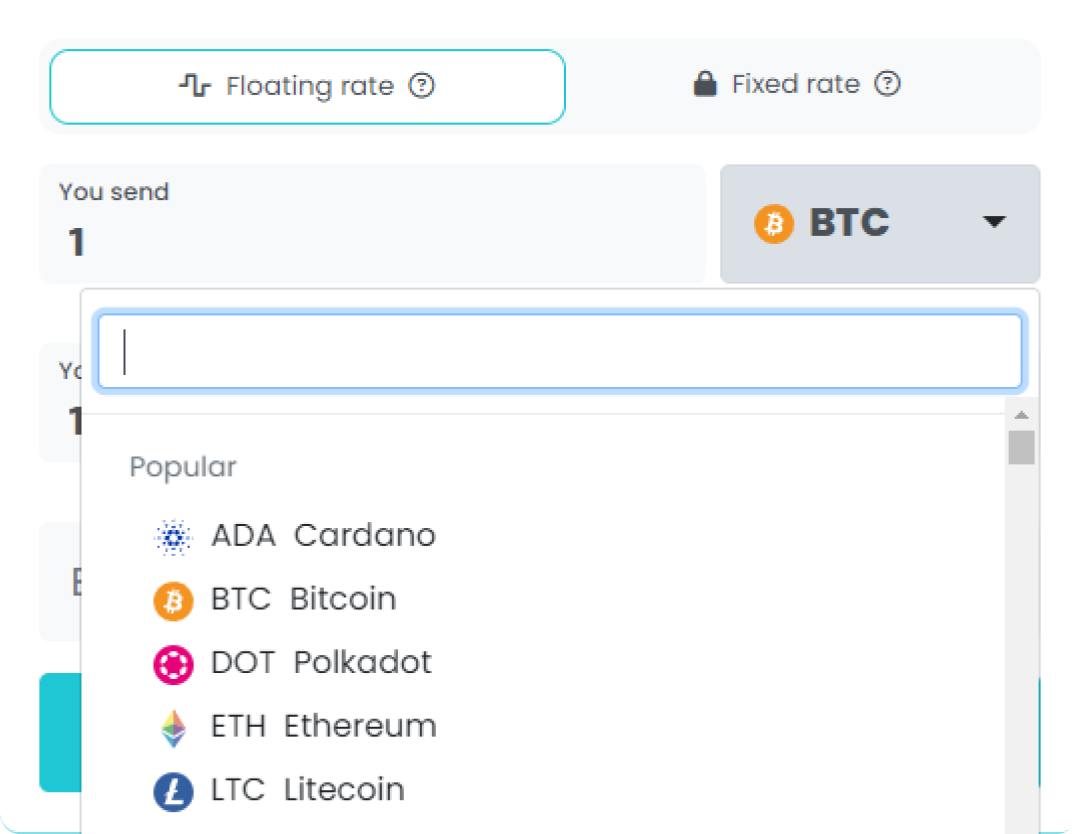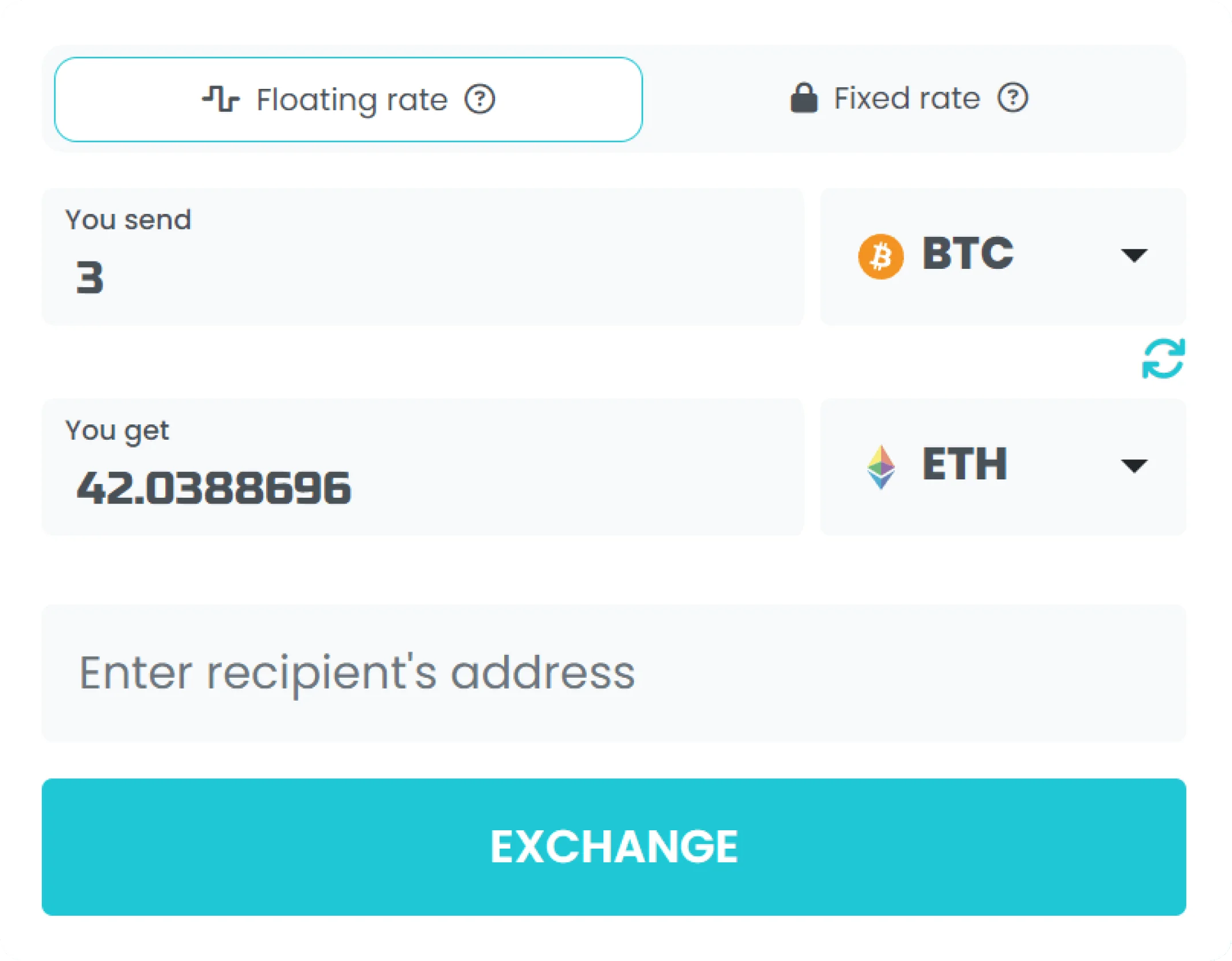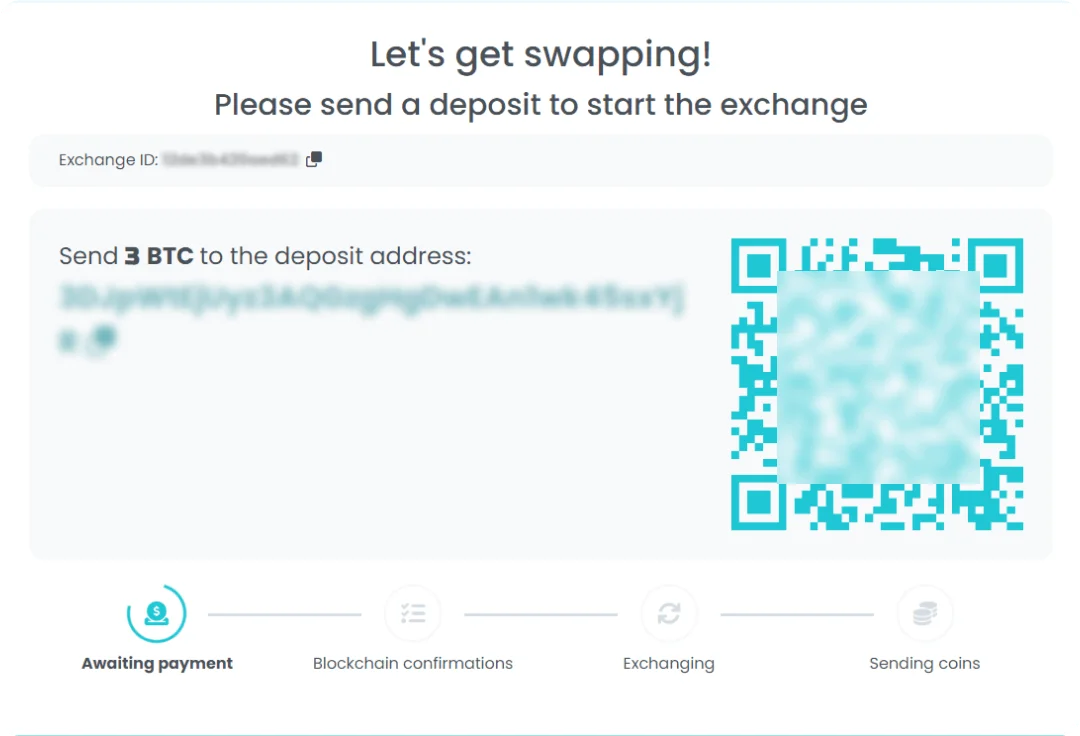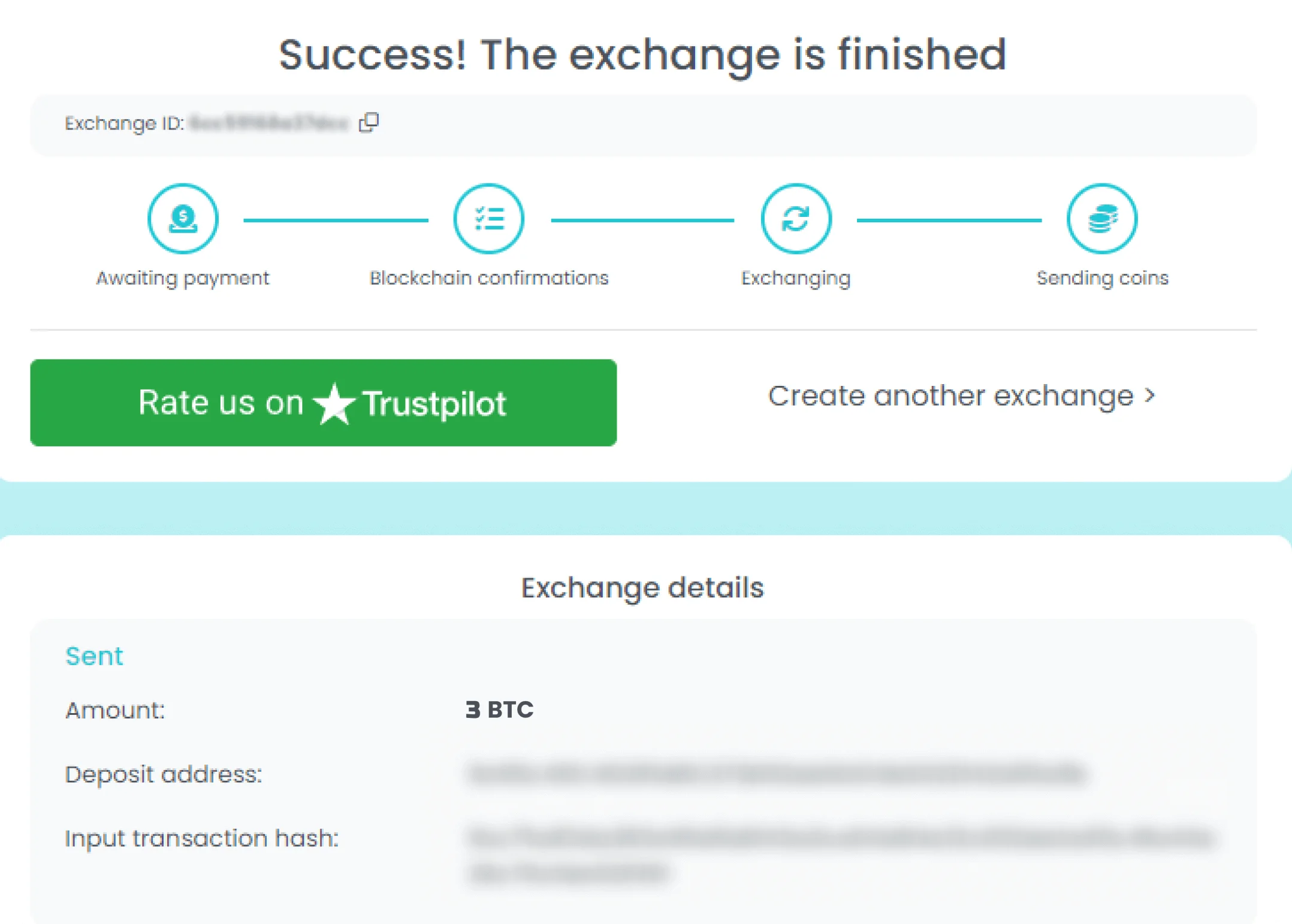How to Exchange QTUM (QTUM)
Exchange QTUM instantly
Swap QTUM (QTUM) in a few clicks on Exchang.io.
Registration and limits free service.
Historical Price Chart
QTUM Current Market Data
| Name | QTUM |
|---|---|
| Price | $2.94 |
| Price Change 24h | 0.83% |
| Price Change 7d | -2.81% |
| Price Change 30d | -17.33% |
| Price Change 60d | -4.08% |
| Market Cap | $307,651,586.60 |
| Circulating Supply | 104,755,842.00 QTUM |
| Volume 24h | $34,823,945.97 |
How to Exchange QTUM in Just a Few Straightforward Steps
If you are looking to QTUM exchange, you are in the right place. Swap QTUM in a matter of minutes using Exchang.io crypto exchange. Just adhere to these 4 simple steps.




Benefits of Exchanging QTUM on Exchang.io

Simple
We make sure not to overload our website with unnecessary elements. Only the things you need for smooth QTUM conversions.Simple and clear.

Secure
Exchang.io is a safest place to exchange QTUM. Get QTUM anonymously, without KYC and registration.
In touch
Write to us in any unclear situation with QTUM swaps. Our support team is happy to help you 24/7.
Fast
We are constantly upgrading our platform to make QTUM exchanges really fast. The average speed for the swap is about 5-15 minutes.Popular QTUM trading pairs
Here are some popular QTUM trading pairs. You can buy QTUM with every listed coin on Exchang.io.
How Much QTUM Can I Exchange on Exchang.io?
Exchanging QTUM on Exchang.io is unlimited. You can start swapping QTUM right now starting from the lower limit of ≈ $3.
There are no upper limits for QTUM exchanges at Exchang.io. Exchange QTUM with other cryptocurrencies from the list of over 700 coins as much as you want to.
Cross-chain exchanges are available; just choose any coin on any network and click the Exchange button, and we'll do the rest for you
Why exchange QTUM?
Things you will be able to do with exchanged QTUM:
With your QTUM cryptocurrency, you can engage in various activities. Firstly, you can use QTUM to make purchases and transactions within the QTUM ecosystem or with merchants that accept it as a form of payment. Additionally, you can participate in decentralized applications (dApps) built on the QTUM blockchain, utilizing its smart contract capabilities for various purposes such as gaming, finance, or governance. Furthermore, you can trade QTUM on different exchanges, allowing you to buy or sell the coin based on market demand and price fluctuations. Lastly, you can store your QTUM securely in a compatible wallet, ensuring the safety and accessibility of your cryptocurrency holdings.
What is QTUM?
QTUM cryptocurrency is a digital asset that operates on its own blockchain platform. It was launched in 2017 by the Singapore-based Qtum Foundation, aiming to combine the best features of Bitcoin and Ethereum. QTUM stands for Quantum, which symbolizes the project's focus on bridging traditional cryptocurrencies with real-world applications.
One key feature that sets QTUM apart from other cryptocurrencies is its use of the Proof-of-Stake (PoS) consensus mechanism. Unlike Bitcoin and many other coins that rely on energy-intensive Proof-of-Work (PoW), QTUM allows token holders to participate in block validation and earn rewards by staking their coins in a wallet, thereby reducing energy consumption and increasing scalability.
Another distinguishing characteristic of QTUM is its compatibility with the Ethereum Virtual Machine (EVM). This means developers can write smart contracts using popular programming languages like Solidity and deploy them on the QTUM blockchain. By leveraging the EVM, QTUM opens up a vast ecosystem of existing Ethereum applications and developer tools, enabling seamless integration and interoperability between the two platforms.
QTUM also offers its own Decentralized Applications (DApps) platform called "Qtum x86 Virtual Machine," which supports code written in C, C++, Rust, and other languages. This unique feature provides more flexibility for developers, allowing them to build decentralized applications with higher performance capabilities compared to those running on the EVM.
In terms of exchanges, QTUM is listed on numerous major cryptocurrency exchanges, making it readily available for trading and investment purposes. Its presence on these platforms facilitates liquidity and ensures users have multiple options to buy or sell QTUM tokens based on market demand and price fluctuations.
When it comes to transactions, QTUM offers fast confirmation times and low fees due to its PoS consensus model. Users can send and receive QTUM quickly and cost-effectively, making it suitable for everyday transactions and micro-payments. The QTUM blockchain ensures the security and immutability of these transactions, providing a transparent and decentralized ledger for all network activity.
Brief History of QTUM
QTUM (Quantum) is a cryptocurrency that was launched in 2017 with the goal of combining the best aspects of Bitcoin and Ethereum. It is built on its own blockchain platform, which utilizes a proof-of-stake consensus algorithm. This allows QTUM to be more scalable and energy-efficient compared to other cryptocurrencies that use proof-of-work.
The history of QTUM can be traced back to a project called Quantum, which was co-founded by Patrick Dai in 2016. Quantum aimed to create a smart contract platform that could bridge the gap between Bitcoin and Ethereum. In March 2017, the Quantum team conducted an initial coin offering (ICO) and raised approximately $15 million worth of Bitcoin and Ethereum.
Shortly after the ICO, Quantum rebranded to QTUM and launched its mainnet in September 2017. The mainnet provided developers with a platform to build decentralized applications (dApps) and smart contracts using the solidity programming language, which is commonly used in Ethereum.
One of the notable features of QTUM is its compatibility with existing Bitcoin infrastructure. This means that developers can leverage the security and stability of the Bitcoin network while enjoying the additional functionalities provided by QTUM. This unique combination has attracted attention from both the Bitcoin and Ethereum communities.
Over the years, QTUM has gained recognition and adoption in the cryptocurrency space. It has formed partnerships with various companies and organizations, including Baofeng, a leading video entertainment platform in China, and Qihu 360, a prominent Chinese internet security company. These partnerships have helped increase the value and visibility of QTUM in the market.
As of now, QTUM is listed on several major exchanges, including Binance, Huobi, and OKEx. Its availability on these exchanges makes it easy for users to buy and trade QTUM. The price of QTUM is determined by the supply and demand dynamics on these exchanges, as well as other factors that influence the overall cryptocurrency market.
To store QTUM, users can utilize QTUM-compatible wallets, such as the official QTUM Core wallet or third-party wallets like Ledger and Trezor. These wallets provide a secure way to store and manage QTUM tokens, ensuring that users have full control over their funds.
QTUM Key Advantages and Unique Features
QTUM is a cryptocurrency that offers several key advantages and unique features in the blockchain space. One of its notable strengths lies in its ability to combine the reliability and security of Bitcoin's blockchain with the flexibility and scalability of Ethereum's smart contracts. This hybrid approach positions QTUM as an innovative platform for decentralized applications (dApps) and enterprise solutions.
Unlike many other cryptocurrencies, QTUM utilizes a proof-of-stake (PoS) consensus algorithm, which allows holders of QTUM coins to participate in the network's block validation process. This approach significantly reduces energy consumption and ensures a more sustainable and environmentally friendly operation compared to traditional proof-of-work systems like Bitcoin. Additionally, this PoS mechanism enables users to earn staking rewards by simply holding their QTUM coins in a supported wallet, thereby incentivizing long-term ownership.
In terms of interoperability, QTUM stands out by providing compatibility with existing blockchain infrastructures. It achieves this through its Account Abstraction Layer (AAL), which acts as a bridge between the different virtual machines used by various blockchain networks. This feature allows developers to build decentralized applications that can interact seamlessly across multiple blockchain platforms, opening up new possibilities for cross-chain functionality and collaboration.
QTUM also boasts an efficient and secure infrastructure for deploying smart contracts. By utilizing the UTXO model, similar to Bitcoin, it ensures enhanced privacy and security for transactions. Moreover, QTUM's use of the Solidity programming language—popularized by Ethereum—facilitates easier adoption for developers already familiar with Ethereum's smart contract ecosystem. This compatibility attracts a broader range of developers and promotes faster development and deployment of dApps on the QTUM network.
Another notable advantage of QTUM is its focus on mobile accessibility. With a mobile-first approach, QTUM aims to bring blockchain technology to the masses by offering a user-friendly experience on smartphones and tablets. Supporting both Android and iOS devices, QTUM provides a mobile wallet that allows users to store, send, receive, and manage their coins easily. This commitment to mobile accessibility aligns with the increasing trend of mobile device usage and ensures that QTUM remains accessible to a wide range of users.
10 Facts About QTUM
- QTUM is a cryptocurrency that combines the benefits of Bitcoin's blockchain with the functionality of the Ethereum platform. It aims to create a secure and decentralized network for businesses and developers to build and deploy smart contracts.
- QTUM utilizes a proof-of-stake consensus mechanism, which means that instead of mining, users can earn rewards by holding and staking their coins in a QTUM wallet. This promotes network security and reduces energy consumption compared to traditional proof-of-work systems.
- The QTUM blockchain supports the development of decentralized applications (DApps) and allows for the creation of custom tokens. This enables businesses to leverage the power of blockchain technology and create their own unique solutions on the QTUM platform.
- QTUM has gained popularity due to its ability to bridge the gap between different blockchain ecosystems. By incorporating a technology called "Account Abstraction Layer," QTUM allows for compatibility with both Bitcoin and Ethereum-based smart contracts.
- QTUM has its native token called QTUM, which is used for various purposes within the ecosystem. Users can use QTUM tokens to pay for transaction fees, participate in decentralized governance, and access additional features offered by the platform.
- When it comes to exchanges, QTUM is listed on numerous reputable cryptocurrency exchanges, making it easily accessible for traders and investors. Some of the popular exchanges where you can buy and sell QTUM include Binance, Huobi, OKEx, and KuCoin.
- The price of QTUM fluctuates in response to market demand and supply dynamics. Traders can track the current price of QTUM on cryptocurrency exchange platforms or through market data aggregators.
- With its scalable and efficient blockchain architecture, QTUM aims to address the limitations of existing cryptocurrencies and provide a robust foundation for mainstream adoption. It focuses on delivering practical solutions for real-world businesses and industries.
- QTUM has gained recognition and partnerships with various companies and organizations, including Amazon Web Services (AWS) and Baofeng, one of the largest video platforms in China. These collaborations further validate the potential of QTUM and its applications.
- In conclusion, QTUM offers a unique blend of features from Bitcoin and Ethereum, making it an attractive option for businesses and developers seeking a secure and flexible blockchain platform. With its strong industry partnerships and ongoing development, QTUM continues to position itself as one of the best cryptocurrencies for building decentralized applications and facilitating secure transactions.
What is the Best Place to Exchange QTUM?
Via Exchang.io service you can effortlessly swap QTUM for over 700+ different assets. Begin by selecting QTUM and your desired coin, paying attention to the network when making your choice. Next, provide the recipient's wallet address for the coin you're swapping to, and press 'Exchange' to continue. Deposit the required amount of QTUM to the address displayed on the screen, ensuring you have the necessary amount to finalize the transaction. Once completed, check your wallet to confirm the arrival of your newly acquired coin. Exchang.io makes exchanging QTUM simple and convenient, allowing you to enjoy a seamless experience with an extensive selection of coins to choose from.
Do I need to create an account on Exchang.io to swap QTUM?
No, there is no need to create an account or provide personal information on Exchang.io. The platform is registration-free and does not require any ID verification. Simply follow the simple steps to buy QTUM with your chosen cryptocurrency.
How long does it take to exchange QTUM on Exchang.io?
The exchange process on Exchang.io is usually very fast and typically takes only a few minutes to complete. However, the actual time may vary slightly depending on network traffic and transaction confirmation times.
What is the minimum amount needed to swap QTUM on Exchang.io?
There is a minimum amount required for QTUM exchange on Exchang.io. It's important to note that this minimum amount may change, so it is recommended to check the platform for the latest requirements.
Is Exchang.io legit? Why should I trust Exchang.io?
Exchang.io is a legitimate platform operated by a team of experienced crypto enthusiasts with over 7 years of industry experience. The platform's main goal is to provide a user-friendly and transparent service. To ensure continuous improvement, Exchang.io closely monitors community feedback on social networks. You can also check reviews on Exchang.io.com to gain further trust in the platform.
What are some popular QTUM trading pairs?
Popular trading pairs for QTUM on Exchang.io include QTUM/BTC, QTUM/ETH, QTUM/LTC, and QTUM/USDT, among others.
Are cross-chain exchanges available for QTUM?
Yes, Exchang.io supports cross-chain exchanges for QTUM. You can choose any coin on any network, click the 'Exchange' button, and Exchang.io will handle the rest. This allows you to easily swap QTUM between different cryptocurrencies and networks.
